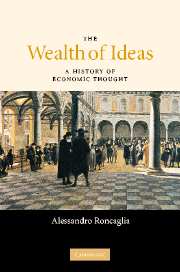Book contents
- Frontmatter
- Contents
- Preface
- 1 The history of economic thought and its role
- 2 The prehistory of political economy
- 3 William Petty and the origins of political economy
- 4 From body politic to economic tables
- 5 Adam Smith
- 6 Economic science at the time of the French Revolution
- 7 David Ricardo
- 8 The ‘Ricardians’ and the decline of Ricardianism
- 9 Karl Marx
- 10 The marginalist revolution: the subjective theory of value
- 11 The Austrian school and its neighbourhood
- 12 General economic equilibrium
- 13 Alfred Marshall
- 14 John Maynard Keynes
- 15 Joseph Schumpeter
- 16 Piero Sraffa
- 17 The age of fragmentation
- 18 Where are we going? Some (very tentative) considerations
- References
- Index of names
- Subject index
17 - The age of fragmentation
Published online by Cambridge University Press: 22 September 2009
- Frontmatter
- Contents
- Preface
- 1 The history of economic thought and its role
- 2 The prehistory of political economy
- 3 William Petty and the origins of political economy
- 4 From body politic to economic tables
- 5 Adam Smith
- 6 Economic science at the time of the French Revolution
- 7 David Ricardo
- 8 The ‘Ricardians’ and the decline of Ricardianism
- 9 Karl Marx
- 10 The marginalist revolution: the subjective theory of value
- 11 The Austrian school and its neighbourhood
- 12 General economic equilibrium
- 13 Alfred Marshall
- 14 John Maynard Keynes
- 15 Joseph Schumpeter
- 16 Piero Sraffa
- 17 The age of fragmentation
- 18 Where are we going? Some (very tentative) considerations
- References
- Index of names
- Subject index
Summary
Introduction
Over the past fifty years or so we have seen a veritable fragmentation of economic theory. Research has ramified in different directions and its very foundations – methods and techniques of analysis, crucial concepts and simplifying assumptions, central problems – have undergone broad diversification. This has led to a division of labour among substantially autonomous groups of economists who often ignore, or in any case do not take into account in their own research, what happens in other areas of research. This trend has been reinforced by the high level of technicality that, together with diversification in the techniques of analysis, makes the studies required for any given field of research increasingly specific and time-consuming. For instance, the new evolutionary theories of the firm have no relation to research on the microeconomic foundations of macroeconomics; it would be quite difficult to find some common ground between research on the institutional evolution of financial markets and the so-called ‘new growth theory’ which seeks to make technical progress endogenous to the theory itself. Economists become ever more specialised and increasingly limit their readings and their professional contacts to researchers active in the same field and pursuing a similar research orientation; increasing numbers of specialised journals and professional societies are created; the very processes of academic selection favour the fragmentation of economists into separate corporations.
It is thus quite difficult, in this situation, to provide a reasonably balanced and complete illustration of the different streams of economic research.
Information
- Type
- Chapter
- Information
- The Wealth of IdeasA History of Economic Thought, pp. 468 - 504Publisher: Cambridge University PressPrint publication year: 2005
